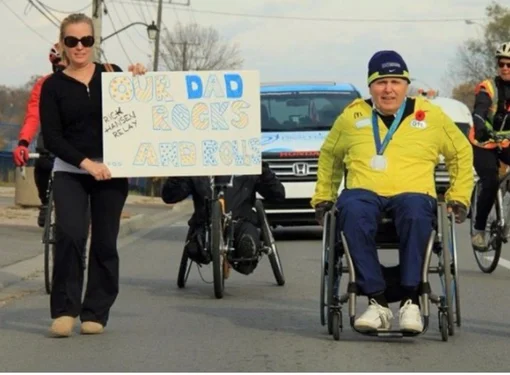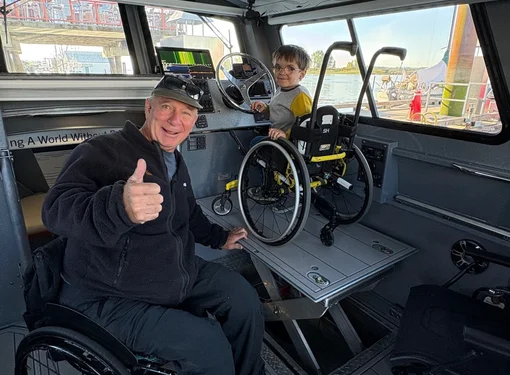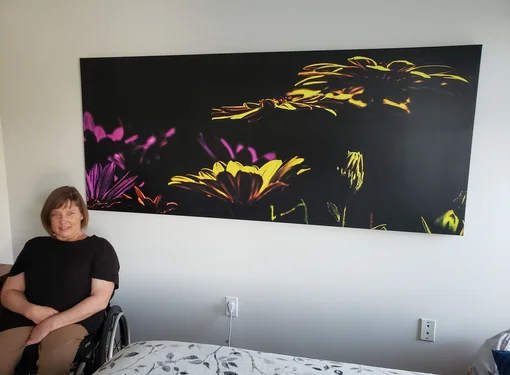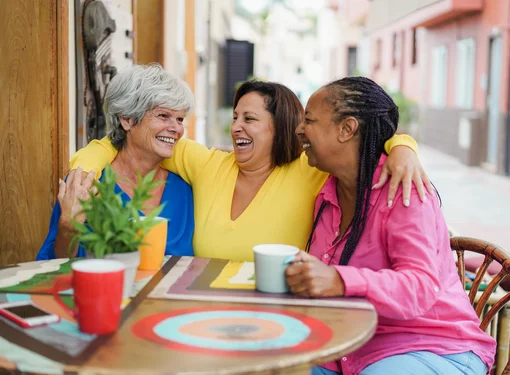Youth with Disabilities Discuss Inclusive Learning Environments
The best people to ask about the state of accessibility and inclusion in the Canadian school system are those with firsthand experience – the students themselves.
Le francais suit l'anglais
On February 16, 2022, the Rick Hansen Foundation (RHF) moderated a side panel event at the United Nations Global Disability Summit titled The Perspective of Youth with Disabilities in Education. The conversation featured six youth, all of whom have a disability.
Yollanda Chimbarami co-founded the non-profit organization Help A Child Save A Nation (HACSAN) in 2017, which aims to improve the lives of vulnerable children in Zimbabwe and Africa who live in under-privileged homes and attend schools in remote areas. Yollanda has an emotional disability.
Mihai Covaser is a first-year student at the University of British Columbia whose goal is to double-major in philosophy, politics and economics, and French. He is a youth living with cerebral palsy.
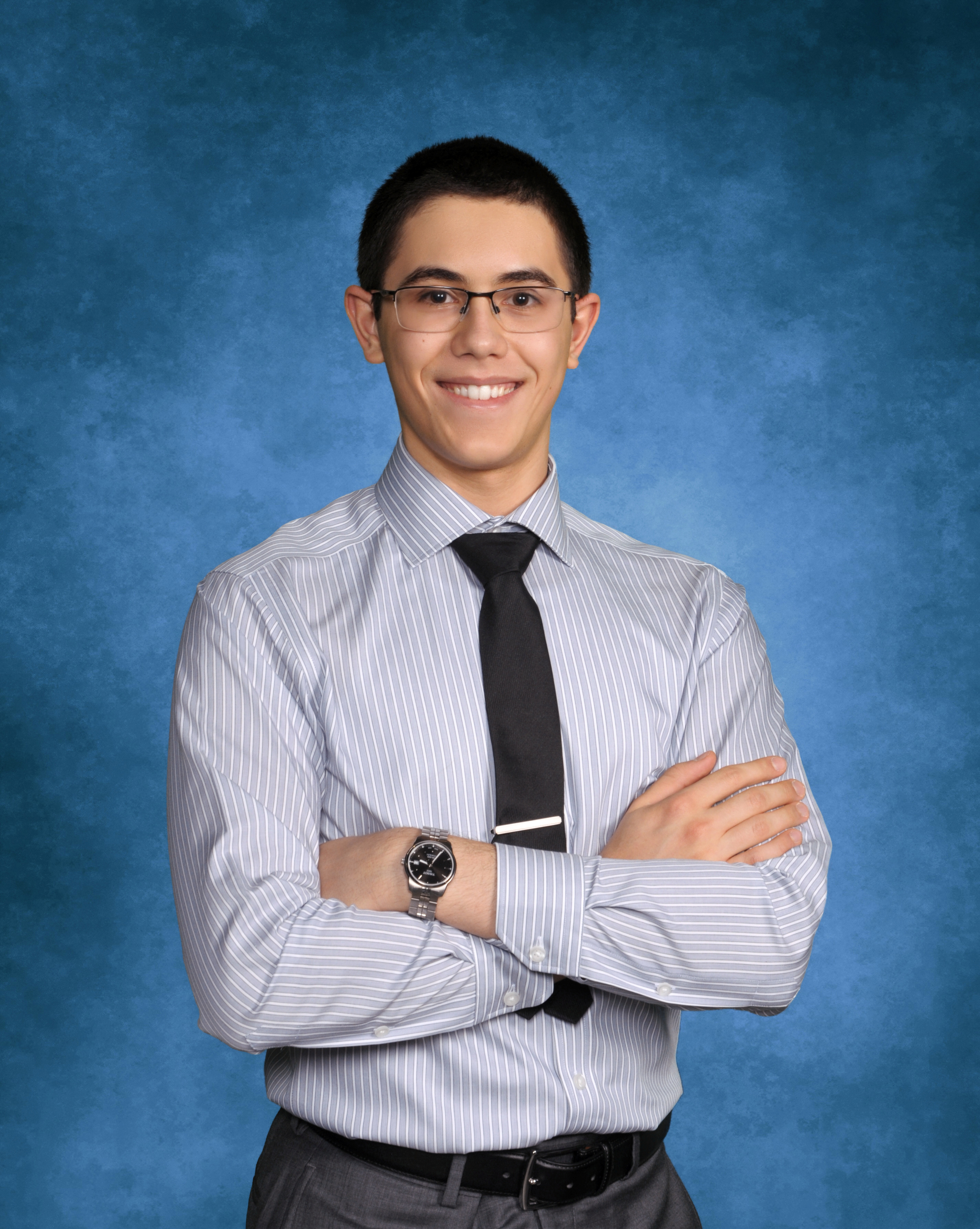
Élise Doucet learned at a young age the importance of advocating for oneself. Élise, who is Deaf, plans on studying STEM after graduating Grade 12.
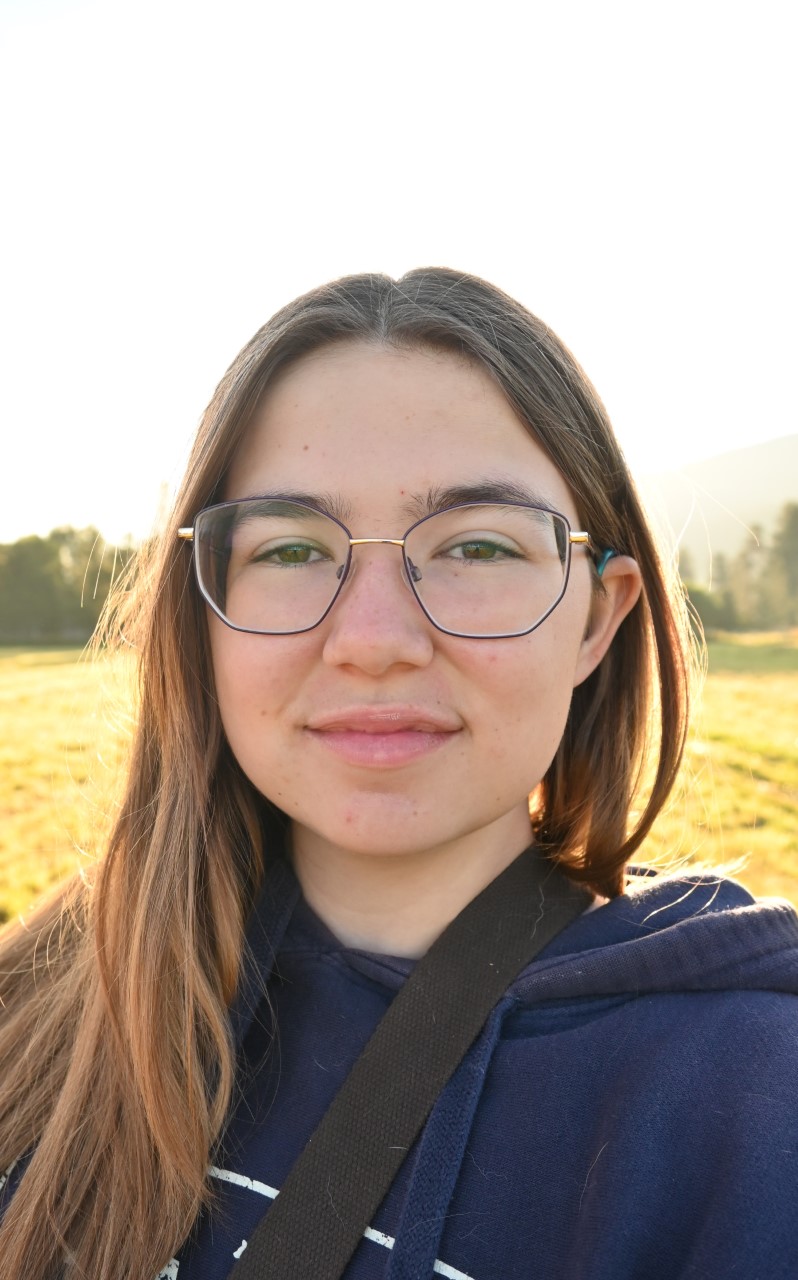
Alexis Holmgren graduated high school in January 2020 only because of online and distance learning opportunities. She has not pursued post-secondary education due to barriers relating to her disabilities. In addition to a heart condition, Alexis lives with solar urticaria, a rare allergy to ultraviolet light and the sun.

Maggie Manning is working on her bachelor of health sciences in respiratory therapy at Thompson Rivers University. Maggie, born with severe bilateral developmental dysplasia of the hips, plans to continue advocating for improved accessibility and inclusion of people with disabilities.
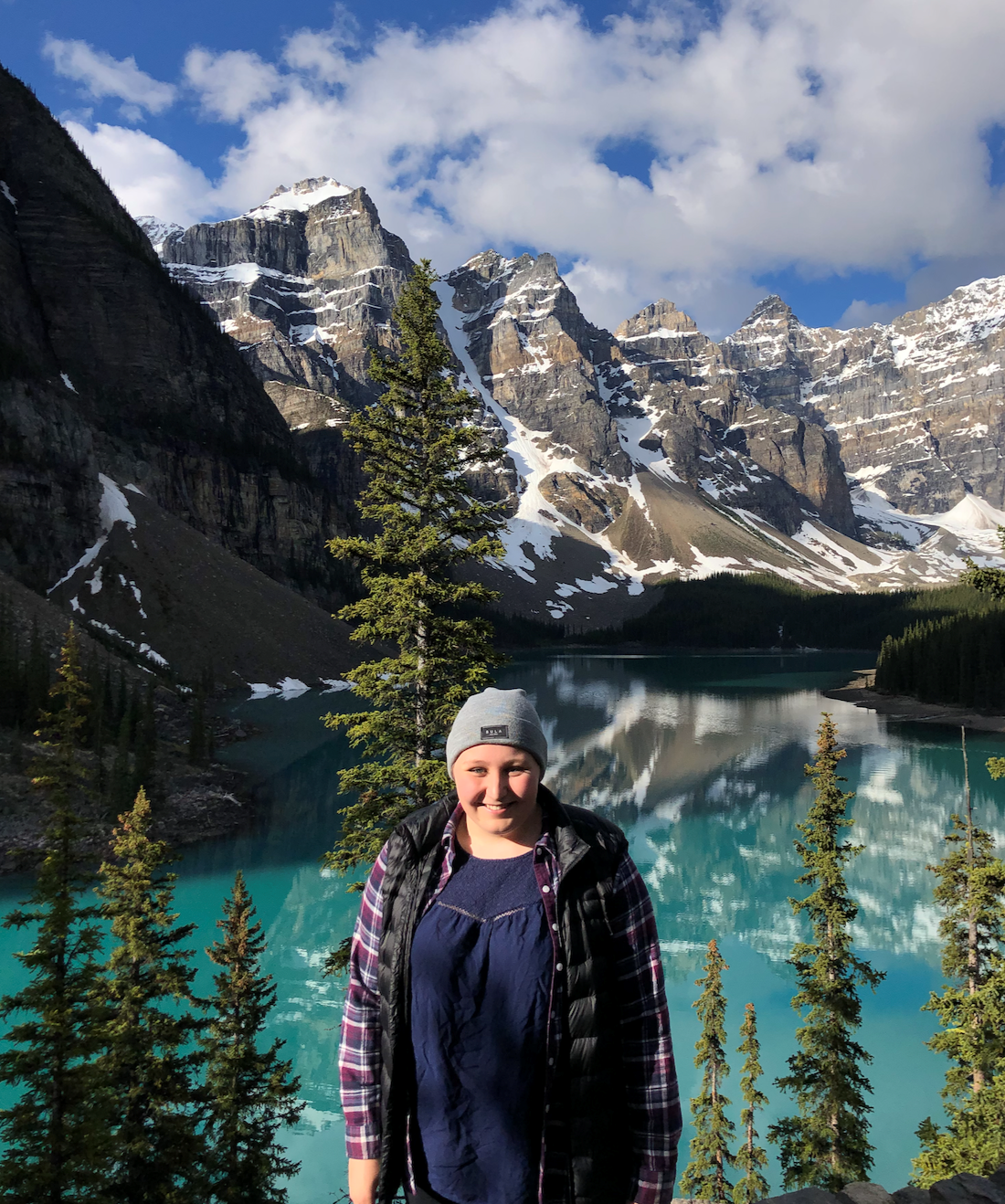
Alejandra Van Dusen is a third-year student at the University of Regina, pursuing a major in health sciences. Alejandra’s passion for accessibility and inclusion was developed during her experience growing up with juvenile arthritis.
Each participant brought a unique lens to their experience as a student with a disability. Here are five learnings we took away from the panel.
Being a youth with a disability in the classroom means self-advocating. Acknowledging their needs goes a long way to inclusion.
All panelists agreed that it takes a consistent effort to be included, and it’s something many people may not even consider.
“For me, and for a lot of us, it takes an applied effort – and thinking a few steps ahead to be included in all the various classroom activities,” said Mihai. “It also means being supported and acknowledged by your peers and staff members when you get the chance to share your story with them.”
Maggie grew up in a small community. She was one of the only students with a physical disability in the community. For her classmates and teachers, it was often the first time they had encountered a person who used mobility aids such as crutches or a wheelchair.
“Unfortunately, I found myself frequently excluded from activities because my educators and peers were scared to ask how adaptations could be made to increase accessibility,” she said. “As I grew up, I learned the importance of being my own advocate and push to change the status quo because my disability shouldn’t be a barrier to my education.”
There are several challenges related to being a student with a disability. Be willing to listen to and learn from them.
Yollanda, who grew up in Africa, said accommodations for people with disabilities, whether physical or emotional, did not exist. No matter the country, panelists agreed that it’s important for educators to be aware of all the aspects that might be associated with disability – including being understanding and accommodating of medical appointments.
“I had to travel six hours to the closest centre with specialized pediatric medical care,” said Maggie. Frequent medical appointments meant I would miss days from school, and this was often overlooked by educators and students.”
For Élise, attitudinal barriers are a source of continual struggle in the classroom.
“It stems from hearing educators and students both being uninformed and unwilling to listen and learn,” she said. “When people are uninformed, they are left to their biases.”
Advocacy drives change. Encourage the sharing of stories in the classroom to help raise awareness about the potential of people with disabilities, and removes stigmas.
“We need to advocate for equity amongst all people,” said Maggie, adding that those little steps add up to big steps. “Together, we can make a tangible difference for future generations of disabled people in hopes of creating a fully accessible and inclusive world where differences are celebrated.”
Alexis agreed. “Sharing my lived experience provides education to help people better understand what it’s like. This introduces a real human lens to the conversation, and allows many of the misconceptions to be dismissed and attitudes to change as we are seen as people.”
It’s also important when creating accessibility solutions and policies in schools that students with disabilities are consulted, pointed out Alejandra. “Historically, students with disabilities have not always had their voices heard. In the name of accessibility and inclusion, students with diverse needs deserve a spot at the table during policy development,” she said.
And, added Mihai, the curriculum for teachers in training needs to be adjusted to better reflect accessibility needs in the classroom.
Educators should not be afraid to ask students what accommodations they need to succeed in the classroom.
“There’s no way that you should be expected, as an educator, to know what to do with a specific student before having a conversation with them. That’s just unreasonable,” said Mihai. “Even if you have some knowledge of what disability needs look like in your classroom, just have that conversation.”
Added Yollanda: “I think it’s really important to include disability in materials like school newsletters and to openly talk about it in classes. Hosting workshops and talks like this, so we can share our experiences and hear other people’s experiences, it helps us become better people.”
What can peers or classmates to do be more supportive of youth with disabilities?
“The first thing is really listening to our experiences, and listening to understand – not listening to further confirm a bias,” said Alexis. “Furthermore, don’t be afraid of us or avoid us simply because we do have disabilities.”
Mihai added: “If you have a question, just ask. Keep asking those questions and I’ll let you know if there’s something you can do for me to make things easier. It’s just a matter of being open and being okay with asking those questions and having those conversations.”
Thank you to all panelists for participating in the Perspective of Youth with Disabilities in Education panel. You are a testament to Rick Hansen’s belief that the power of youth will change the world.
If you missed The Perspective of Youth with Disabilities in Education panel or want to share it with colleagues, family, or friends, you can access the recording here. Consider hosting an RHF Ambassador to virtually speak to your class about disability, inclusion, and accessibility. Book your free Ambassador presentation here.

Le français
Les jeunes en situation de handicap discutent d’environnements d’apprentissage inclusifs
Les personnes les mieux placées pour parler de l’accessibilité et de l’inclusion dans le système scolaire canadien sont celles qui sont directement concernées : les élèves. Le 16 février 2022, la Fondation Rick Hansen (FRH) a animé une table ronde parallèle au Sommet mondial sur le handicap des Nations Unies, intitulée The Perspective of Youth with Disabilities in Education (Le point de vue des jeunes en situation de handicap sur l’environnement éducatif). La conversation a réuni six jeunes personnes, toutes en situation de handicap.
Yollanda Chimbarami a cofondé en 2017 l’organisme sans but lucratif Help A Child Save A Nation (HACSAN) (Aidez un enfant, sauvez une nation), qui vise à améliorer la vie des enfants vulnérables du Zimbabwe et d’Afrique qui vivent dans des foyers défavorisés et qui fréquentent des écoles situées dans des régions éloignées. Mme Chimbarami vit avec un handicap émotionnel.
• Mihai Covaser est étudiant en première année à l’Université de la Colombie-Britannique et il vise à obtenir une double spécialisation en philosophie, politique et économie (PPE) et en français. C’est un jeune qui vit avec la paralysie cérébrale.
• Élise Doucet, qui est sourde, a appris très tôt l’importance de défendre ses intérêts soi-même. Elle prévoit étudier la science, la technologie, l’ingénierie et les mathématiques (STIM) après avoir obtenu son diplôme de 12e année.
• Alexis Holmgren a obtenu son diplôme de fin d’études secondaires en janvier 2020, seulement parce qu’elle a pu bénéficier de possibilités d’apprentissage en ligne et à distance. Elle n’a pas poursuivi d’études postsecondaires en raison des obstacles liés à son handicap. En plus de ses problèmes cardiaques, Mme Holmgren vit également avec une urticaire solaire, une forme d’allergie rare aux rayons ultraviolets et au soleil.
• Maggie Manning étudie en vue de l’obtention d’un baccalauréat en sciences de la santé avec spécialisation en thérapie respiratoire à l’Université Thompson Rivers. Mme Manning, qui est née avec une dysplasie congénitale bilatérale grave des hanches, prévoit continuer à défendre l’amélioration de l’accessibilité et de l’inclusion pour les personnes en situation de handicap.
• Alejandra Van Dusen est étudiante en troisième année à l’Université de Regina et elle se spécialise en sciences de la santé. Mme Van Dusen a cultivé sa passion pour l’accessibilité et l’inclusion au cours de son enfance, quand elle vivait avec l’arthrite juvénile.
Chaque personne participante a fait part de sont point de vue sur son expérience d’élève en situation de handicap. Voici cinq leçons que nous avons tirées du groupe de discussion :
Être une jeune personne en situation de handicap en classe, cela signifie qu’il faut défendre ses intérêts soi-même. Le fait de reconnaître leurs besoins constitue un grand pas vers l’inclusion.
Toutes les personnes du groupe conviennent qu’il faut un effort constant pour se faire inclure, et c’est quelque chose que bien des gens n’envisageraient peut-être même pas.
« Pour moi, et pour beaucoup d’entre nous, cela demande un effort appliqué – et une réflexion afin d’avoir une longueur d’avance – pour être incluse ou inclus dans toutes les différentes activités de la classe », commente Mihai Covaser. « Cela signifie également que vos pairs et les membres du personnel vous appuieront et vous valoriseront lorsque vous leur raconterez votre histoire. »
Mme Manning a grandi dans une petite collectivité. Elle était parmi les rares élèves en situation de handicap. Ses camarades de classe et son personnel enseignant n’avaient parfois jamais rencontré avant elle une personne qui utilisait des aides à la mobilité comme des béquilles ou un fauteuil roulant.
« Malheureusement, j’ai souvent été exclue des activités parce que mon personnel éducateur et mes pairs avaient peur de demander comment on pouvait les adapter pour en améliorer l’accessibilité », admet-elle. « En grandissant, j’ai appris l’importance de défendre mes propres intérêts et de faire pression pour changer le statu quo, parce que mon handicap ne devrait pas être un obstacle à mon éducation. »
Le fait d’être aux études et en situation de handicap pose plusieurs problèmes. Il faut savoir écouter et en tirer des leçons.
Mme Chimbarami, qui a grandi en Afrique, dit qu’il n’existait pas d’adaptations pour les personnes en situation de handicap, que ce soit un handicap physique ou émotionnel. Quel que soit le pays, les panélistes conviennent de l’importance pour le personnel éducateur de prendre conscience de tous les aspects susceptibles d’être associés au handicap, y compris de faire preuve de compréhension et d’adaptation en cas de rendez-vous médicaux.
« J’ai dû faire six heures de route pour me rendre au centre spécialisé dans les soins pédiatriques le plus proche », explique Mme Manning. « Mes nombreux rendez-vous médicaux m’obligeaient à manquer des jours d’école, ce dont le personnel éducateur ou les élèves ne tenaient souvent pas compte. »
Pour Mme Doucet, les obstacles comportementaux représentent une source de difficultés permanentes en classe.
« Ces obstacles découlent d’un manque d’information de la part du personnel éducateur et des élèves qui peuvent entendre ainsi que d’un manque de volonté d’écouter et d’apprendre », déplore-t-elle. « Quand les personnes ne sont pas bien informées, elles se fient à leurs préjugés. »
La défense des intérêts favorise le changement. Il faut encourager les jeunes à raconter leurs histoires en classe pour aider à sensibiliser les gens au potentiel des personnes en situation de handicap et à éliminer les préjugés.
« Nous devons militer en faveur de l’équité pour toutes les personnes », ajoute Mme Manning, qui précise que ces petits pas s’additionnent pour devenir de grands pas. « Ensemble, nous pouvons faire une différence concrète pour les futures générations de personnes en situation de handicap, dans l’espoir d’édifier un monde pleinement accessible et inclusif au sein duquel on valorise les différences. »
Mme Holmgren approuve. « Le fait de raconter mon expérience me permet d’éduquer les gens pour les aider à mieux comprendre ce que c’est. Cela apporte une perspective humaine à la conversation et permet de renverser bon nombre d’idées et de changer les attitudes, car on nous perçoit comme des personnes. »
« Il importe également de consulter les élèves en situation de handicap pour élaborer des solutions et des politiques d’accessibilité dans les écoles », souligne Mme Van Dusen. « Par le passé, on n’écoutait pas toujours les élèves en situation de handicap. Au nom de l’accessibilité et de l’inclusion, les élèves qui ont des besoins divers méritent de participer à l’élaboration des politiques », ajoute-t-elle.
« Et on doit adapter le programme du personnel enseignant en formation afin de mieux refléter les besoins en matière d’accessibilité dans les classes », renchérit M. Covaser.
Le personnel éducateur ne doit pas hésiter à demander aux élèves de préciser les adaptations nécessaires à leur réussite en classe.
« On ne s’attend absolument pas à ce que le personnel éducateur sache exactement quoi faire dans une situation particulière avant d’en avoir discuté avec l’élève en question. « Ce n’est tout simplement pas raisonnable », estime M. Covaser. « Même si vous savez à quoi ressemblent les besoins des personnes en situation de handicap dans votre classe, prenez le temps d’en discuter. »
« Je pense qu’il est essentiel d’inclure le sujet des handicaps dans des documents comme dans l’infolettre de l’école et d’en parler ouvertement en classe », ajoute Mme Chimbarami. « L’organisation d’ateliers et de débats comme celui-ci, qui nous permettent de faire part de nos expériences et d’entendre celles des autres, nous aide à nous améliorer. »
Que peuvent faire les pairs ou les camarades de classe pour être plus solidaires des jeunes en situation de handicap?
« D’une part, il faut vraiment écouter nos expériences et écouter pour comprendre, pas pour confirmer un préjugé », explique Mme Holmgren. « D’autre part, il ne faut pas avoir peur de nous ou nous éviter simplement parce que nous sommes en situation de handicap. »
« Si vous avez une question, posez-la », continue M. Covaser. « Continuez de poser vos questions et je vous ferai savoir si vous pouvez faire quelque chose pour me faciliter la tâche. Il s’agit simplement de faire preuve d’ouverture et d’accepter de poser ces questions et d’avoir ces conversations. »
Merci à toutes et tous les panélistes d’avoir participé à The Perspective of Youth with Disabilities in Education (Le point de vue des jeunes en situation de handicap sur l’environnement éducatif). Vous illustrez à merveille la conviction de Rick Hansen à savoir que les jeunes ont le pouvoir de changer le monde.
Si vous avez manqué The Perspective of Youth with Disabilities in Education (Le point de vue des jeunes en situation de handicap sur l’environnement éducatif) ou si vous souhaitez en faire part à des collègues, des camarades ou des membres de votre famille, vous pouvez accéder à l’enregistrement ici (en anglais). Envisagez d’accueillir une ambassadrice ou un ambassadeur de la FRH qui s’adressera virtuellement à votre classe pour parler des handicaps, de l’inclusion et de l’accessibilité. Réservez dès aujourd’hui votre présentation d’ambassadrice ou d’ambassadeur en cliquant ici.

